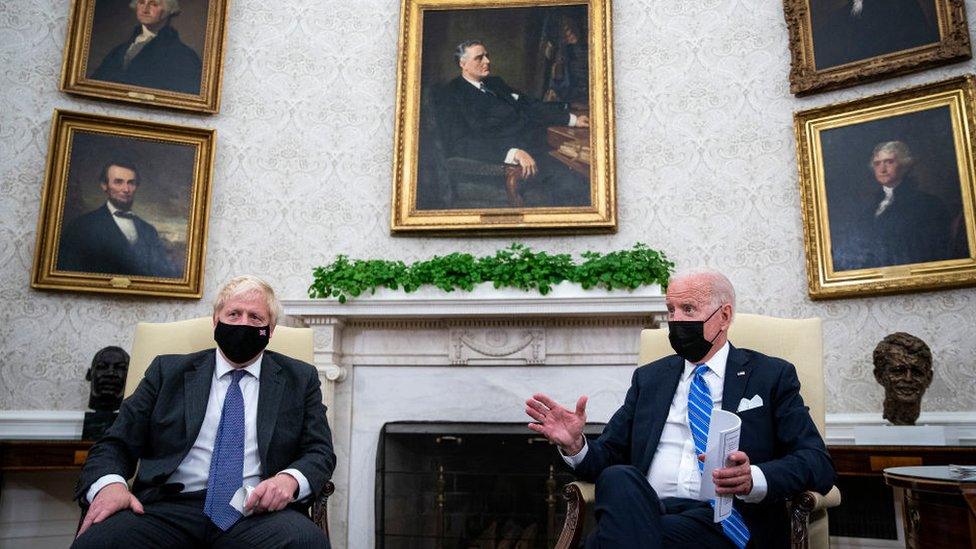Biden meets Boris: Shared priorities but some bumps remain
- Published

Boris Johnson met Joe Biden at the Oval Office in the White House
With Joe Biden and the Democrats back in charge in Washington, the US was expected to strengthen ties with Europe and put the UK, to paraphrase Barack Obama, toward the back of the queue.
Donald Trump's focus on transactional diplomacy and penchant for one-on-one deals was out; multilateralism was again in vogue.
That's not exactly how things have played out, however.
On Tuesday morning, Biden gave a speech at the United Nations emphasising the need for collective action by the community of nations.
But by the evening, he was back at the White House for a one-on-one meeting with Boris Johnson, talking up a US-UK relationship that has taken on greater relevance for the Biden administration in the past few weeks.
The location conveyed as much about the importance of the meeting for the Americans as the brief opening statements and two quickly answered questions (both from British reporters chosen by Johnson, much to the consternation of US journalists).
This sit-down could have been held in a New York conference room; instead it was in the Oval Office, surrounded by the trappings of US power. That sends a message.
Watch: President Biden's first UN General Assembly speech
Although Johnson earlier spoke of US-UK relations that are "as good as they have been in decades", there are still a few bumps in the road.
The US seems uninterested in prioritising a new trade deal. Biden's "we'll have to work that through" comment on Tuesday wasn't exactly an enthusiastic response.
The president, who regularly boasts of his Irish heritage, has also warned of what he sees as the danger Brexit poses to stability in Northern Ireland - a point he again alluded to on Tuesday.
Shared priorities, however, seem to have prevailed. With Johnson, Biden has found a welcome partner in tackling climate change.
And the two nations appear headed toward an even closer security relationship following the US-UK-Australia pledge to share military and intelligence assets - a development Johnson said "has great potential" to benefit the world.
That Aukus triumvirate is almost Trumpian in its nature; an Anglophone alliance that sidelines continental Europe and positions itself to face off against Chinese territorial ambitions.
China scoffs at a "cold war mentality". The French fume at a diplomatic snub that cost them billions in their nixed Australian submarine deal. But Biden has a plan for his foreign policy, and it appears the UK has a prominent part in it.
Tuesday's Oval Office meeting was further evidence of that.
MORE FROM ANTHONY: Five huge challenges for Joe Biden
